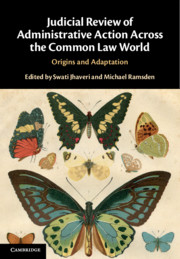Book contents
- Judicial Review of Administrative Action across the Common Law World
- Judicial Review of Administrative Action across the Common Law World
- Copyright page
- Contents
- Contributors
- Foreword
- Acknowledgments
- Table of Cases
- Table of Legislation
- Abbreviations
- Part I Introduction
- Part II Origins and Adaptations of Judicial Review in England
- Part III Origins and Adaptations in the British Isles
- 5 The Influence of English Judicial Review on Scots Judicial Review
- 6 The Constitutionalisation of English Judicial Review in Ireland
- Part IV Origins and Adaptations in North America and Canada
- Part V Origins and Adaptations in the Middle East and Africa
- Part VI Origins and Adaptations in Asia
- Part VII Origins and Adaptations in Australasia
- Part VIII Conclusion: Interrogating “Common Law” Approaches to Judicial Review
- Index
6 - The Constitutionalisation of English Judicial Review in Ireland
Continuity and Change
from Part III - Origins and Adaptations in the British Isles
Published online by Cambridge University Press: 19 March 2021
- Judicial Review of Administrative Action across the Common Law World
- Judicial Review of Administrative Action across the Common Law World
- Copyright page
- Contents
- Contributors
- Foreword
- Acknowledgments
- Table of Cases
- Table of Legislation
- Abbreviations
- Part I Introduction
- Part II Origins and Adaptations of Judicial Review in England
- Part III Origins and Adaptations in the British Isles
- 5 The Influence of English Judicial Review on Scots Judicial Review
- 6 The Constitutionalisation of English Judicial Review in Ireland
- Part IV Origins and Adaptations in North America and Canada
- Part V Origins and Adaptations in the Middle East and Africa
- Part VI Origins and Adaptations in Asia
- Part VII Origins and Adaptations in Australasia
- Part VIII Conclusion: Interrogating “Common Law” Approaches to Judicial Review
- Index
Summary
The constitutionalisation of Irish public law – first on independence in 1922 and then in 1937 on the adoption of the Irish Constitution – has had a marked effect on the development of Irish administrative law. My two objectives here are, first, to describe the constitutional influences on the development of Irish administrative law and, second, to demonstrate that Ireland has an indigenous administrative law. I begin in Part I with a brief historical introduction before moving in Part II to a discussion of the influence of the Constitution. In some areas, notwithstanding the adoption of the Constitution, legal life has gone on as before. The supervisory role of the superior courts has continued mostly unaltered, despite constitutional language that might be thought to justify a more intrusive judicial review jurisdiction. The law in relation to procedural fairness has been constitutionalised – and has a bespoke term, “constitutional justice” – but is not markedly different in substance from the English equivalent. However, there have been some important changes. With sovereignty residing in the People, rather than the Crown, the prerogative has been held not to have survived the transition to a new constitutional order. The permissible scope of delegation of power by the legislature has also been circumscribed. The constitutionalisation of judicially enforceable fundamental rights, meanwhile, meant that Irish administrative lawyers followed a ‘rights-based’ approach before their counterparts elsewhere in the common law world began to think in such terms. Finally, even though the supervisory role of the superior courts remains intact, it now has constitutional protection, such that limitations on access to judicial review are strictly policed and, potentially, unconstitutional. In Part III, I will tentatively suggest that the existence of the Constitution, and thus of an identifiably indigenous Irish administrative law, has prompted Irish judges to be self-confident enough to refuse to follow settled English law. There are some important areas where Irish administrative law has not tracked English administrative law, most notably in relation to error of law and procedural exclusivity (which has had a particular effect on the development of the law of legitimate expectations). In these areas, the Irish courts have operated in the shadow of English law but have sought to develop an indigenous approach.
Keywords
- Type
- Chapter
- Information
- Judicial Review of Administrative Action Across the Common Law WorldOrigins and Adaptation, pp. 98 - 114Publisher: Cambridge University PressPrint publication year: 2021
- 1
- Cited by



